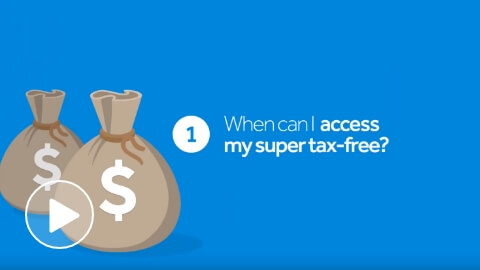When can you access your super?
Because superannuation is a compulsory, long-term investment designed to provide you with savings for your retirement, there are rules about what age you can access your super.
Rules for accessing your super
Rules for accessing your super:
You can access your super, without restrictions, even if you're still working.1
Rules for accessing your super:
You can access your super as long as you've permanently retired.
If you end an employment arrangement on or after age 60, you can also access the super you've earned up until then.
If you're not ready to retire, you could use some of your super while you’re still working, with a Transition to Retirement Income account.
Age: Under age 60, born before 1 July 1964
Rules for accessing your super:
If you're under 60, you must have reached your access age and be permanently retired to access your super.
If you're not ready to retire, you could use some of your super while you’re still working, with a Transition to Retirement Income account.
| Date of birth |
Age you can access your super |
| Before 1 July 1960 |
55 |
| 1 July 1960 - 30 June 1961 |
56 |
| 1 July 1961 - 30 June 1962 |
57 |
| 1 July 1962 - 30 June 1963 |
58 |
| 1 July 1963 - 30 June 1964 |
59 |
| From 1 July 1964 |
60 |
Age: Under your access age, born 1 July 1964 or later
Rules for accessing your super:
You would need to meet one of the conditions for early access, such as severe financial hardship or a terminal medical condition.

When can I access my super tax-free?
Find out when you can withdraw your super tax-free as a lump sum, and how it works. Or if you're 60 or over, you can use a retirement income product to get regular income payments from your super tax-free.
Watch the video
When can I access my super tax-free?
Close
When can I withdraw my super early?
While your super is generally locked away until you are retired, there are some circumstances where you can apply to take it out early.
Find out more
Retire with a fund you can trust
Our great range of retirement solutions is just one of the many reasons to retire with QSuper.

Transition to Retirement Income account
Ease into retirement and enjoy regular payments from your super while you're still working. With flexible payment options, and a focus on delivering long-term
returns, see why thousands of members feel confident about transitioning to retirement with us.
Find out more

Retirement Income account
Enjoy life after work and turn your super into a regular income with our award-winning Retirement Income account. As your money stays invested, your savings could continue to grow. Find out why thousands of Australians have partnered with QSuper in retirement.
Find out more

Lifetime Pension
Enjoy security and confidence in retirement with our award-winning Lifetime Pension. It provides an income for the rest of your life, and may even increase your Age Pension payment (if eligible). Find out how you could benefit from this industry-first solution.
Find out more
Frequently asked questions
Your preservation age - or access age - is the government's minimum age that your super must be ‘preserved’ until. It's currently between 55 and 60, depending on when you were born.
When you reach your preservation age, super normally becomes available for you to withdraw or convert to an income stream once you've retired. If you're still working when you reach your preservation age, you can start a Transition to Retirement account instead.
The preservation age for super is different to the government's Age Pension eligibility age.
| Date of birth |
Age you can access your super |
| Before 1 July 1960 |
55 |
| 1 July 1960 - 30 June 1961 |
56 |
| 1 July 1961 - 30 June 1962 |
57 |
| 1 July 1962 - 30 June 1963 |
58 |
| 1 July 1963 - 30 June 1964 |
59 |
| From 1 July 1964 |
60 |
If you stop an employment arrangement on or after turning 60, you are able to access the superannuation you have accumulated up until that point.
If you decide to return to work, you can still access the super you had before you returned to work. But for any contributions from your new employer, you'll need to wait until you leave that job before you can access that super.
If you are aged 60 years old and not yet ready to retire, you could access some of your super while you’re still working by opening a Transition to Retirement (TTR) Income account.
You can use a TTR Income account to reduce your work hours without reducing your income, or as part of a tax strategy in the lead up to retirement, saving you tax while your savings continue to grow.
If you are between 55 and 60 years old, you would normally need to be permanently retired and reached your preservation age to access your super as a lump sum.
Your preservation age is a minimum age, set by the Australian Government, that your super must be ‘preserved’ until. The preservation age is between 55 and 60, depending on the year and month you were born.
However, if you've met your preservation age and want to draw an income from some of your super, but you're not ready to retire, you could open a Transition to Retirement Income account.
Work out your access age
| Date of birth |
Age you can access your super |
| Before 1 July 1960 |
55 |
| 1 July 1960 - 30 June 1961 |
56 |
| 1 July 1961 - 30 June 1962 |
57 |
| 1 July 1962 - 30 June 1963 |
58 |
| 1 July 1963 - 30 June 1964 |
59 |
| From 1 July 1964 |
60 |
Depending on your age, withdrawals and income payments from your super may be taxed. If you're over 60 years of age, it is tax-free. If you're under 60, the taxable portion of any income payments will be taxed at your marginal tax rate (plus Medicare levy), but you'll receive a 15% tax offset.
Lump sum withdrawals are tax-free if you are over age 60, or for amounts under the low rate cap.2
Learn more about how your super is taxed, or read our Tax Explanation factsheet.
Does it affect my Age Pension or other pension when I withdraw my super?
Show content
Yes, lump sum withdrawals and payments from your super can also impact any benefits you are receiving from Centrelink.
Managing government benefits such as the Age Pension can be complex, and small changes can have a big impact, so it pays to get personal financial advice to help you maximise your retirement income.
More retirement information